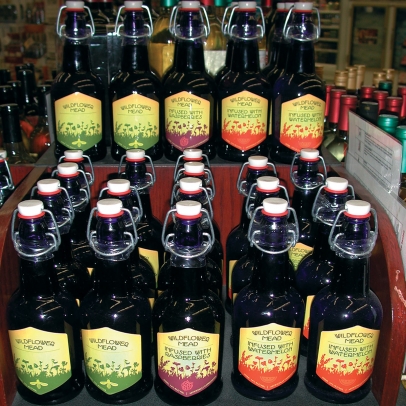Iowans Have to "Bootleg" Bootleg Hill Honey Mead
What do a retired banker, a seasoned beer aficionado, and a die-hard Grateful Dead fan have in common?
They’re all parts of Rick Harris, owner and operator of East Moline’s Bootleg Hill Honey Meads.
“I got tired of wearing suits,” Harris said during a tour of his brewery in the basement of the East Moline home he shares with his wife Mary. “I would have been a hippie if I’d followed my heart, but I followed my mind instead.”
Harris began meading in 1998. He’d been home-brewing beer as a member of MUGZ—the Mississippi Unquenchable Grail Zymurgists, a Quad Cities homebrew club.
“I drank a lot of beer,” he said, laughing. “I decided I wanted to go on a gluten-free diet because I was putting on a lot of weight and had a beer gut.”
He’d read the “Wheat Belly” book by William Davis and learned beer contains fat-happy gluten.
Harris lost 40 pounds sans suds, but his fermenting fervor was still a-foam, so he turned to the food of the gods: mead.
Mead is an alcoholic beverage made by fermenting diluted honey. It’s often flavoured with fruits or spices: hops may be added to give it the bitter twang beer-lovers crave.
Mead has been called “the ancestor of all fermented drinks” because humans were swilling it before they learned how to cultivate crops.
Mead bubbles up in mythology now and then. Doves brought ambrosia to the Greek gods on Olympus. In Norse mythology, Kvasir, a wise creature, was fashioned from the spittle of gods and roamed the land spreading wisdom until two dwarfs killed him, then mixed his blood with honey to make the Mead of Poetry, which flooded the drinker with intellect and turned him into a skáld—a Viking bard of sorts—and that’s how humans gained the gift of rhyming verse.
Many modern beer drinkers believe their suds possess those same powers—until they sober up.
Harris’ meads are full-bodied, fruity and easy sipping, with silky legs when poured into a glass.
They can also knock a mighty Viking to his knees with a 14 percent alcohol content.
Harris started making mead and people liked it. He refined his process and became an ambrosia judge. In 2013, he attended the Mazer Cup in Boulder, Colorado, the only international mead competition in the United States, and was inspired to wax poetic publicly. He decided to launch a meadery.
“Our home was once owned by a bootlegger and our area was known as Bootleg Ridge, or Bootleg Hill,” Harris said. “We played off our love of the Dead and bootleg tapes of their concerts.”
Harris poured sample of his mead to dramatize his story. “Getting this is just the start of the process,” he said, pointing at the golden liquid in his glass. “There’s a lot more you have to do.”
Bootleg Hill is registered with the Illinois business bureau, the U.S. Treasury, and the East Moline health department. Harris had to get permission from all his neighbors—anyone within 250 feet of the house—to have a hearing for a special-use permit for a business in a residential area.
“I had a lot of hoops to jump through,” he said. “The city agreed I could put it in the basement. We got the federal license in January and I thought, ‘That was easy; I’ll just apply for my Illinois license.’ We didn’t get that until October.”
Once Harris was properly papered with permissions and primed with funds raised online, he began retrofitting his basement to city code and installed state-of-the-art fermenting gear. His mead hive has a bevy of 80-gallon non-reactive fermenters and two 200-gallon fermenting tanks.
Harris originally began buying honey in five-gallon buckets, but today he buys it by the 55-gallon drum. He warms his honey under heat lamps to make it easier to pour, then adds water. After hydrating the gluten-free dry yeast at 104 degrees, he pitches it into the mead.
“It’s basically one part honey, two parts water,” he said.
Harris keeps most of the details of his process to himself.
“A by-product of fermentation is CO2; you have to get it out of the mead,” he said. “I have a method by which I remove the CO2. And I don’t talk about which yeast I use, because that’s a secret, too.”
He points to a five-gallon glass bottle filled with extra mead, a hefty two inches of sediment settled at the bottom.
“I used to make mead in a carboy like this,” he said. “What happens is, you set it there and forget about it, and a year later it might be mead, it might not. It’s not predictable. My goal is to make mead quickly, not slowly. A lot of people take honey and water and set it out and let the wild yeast go, and you get mead eventually. What kind of mead and what it tastes like, who knows?”
Harris made his first mead on October tenth of 2014 and bottled it early that December.
“I did it in two months. Most meaderies will tell you it takes three months,” he said.
A key element in the Bootleg Hill flavor comes from blending three different meads together in two 200-gallon fermenters.
“I think it has a better taste. It’s also a bit more distinct,” Harris said.
All of Bootleg Hill’s handmade meads are made from unprocessed wildflower honey and are all-natural and gluten free with no added preservatives, sulphites or artificial flavors.
“We buy our honey from regional apiarists in northeast and southwest Iowa and southern Wisconsin,” Harris said. “We’re trying to obtain some from Illinois in the qualities we need.”
In addition to his butterscotch wildflower mead, Harris creates infusions with raspberries, blueberries, watermelon and Montmorency cherries from Door County, Wisconsin. The fruit is packed into mesh bags and immersed in stainless steel Cornelius kegs originally developed by the soft drink industry.
One taste of his Bootleg Hill cherry mead offers a glimpse of Valhalla.
“What we’ve been doing with the cherry and the blueberry is not filtering it,” Harris said. “Filtering is optional; it depends on the mead. If it’s young, you have to filter it because it’s going to be cloudy, and people don’t want cloudy.”
He said he found that if he filters too much it takes out too much flavor.
“Initially we had to filter a lot. Now we put it into carboys and cold-crash it. The yeast will settle to the bottom and the good mead will be on top.”
Cold crashing is a home-brewing process that clarifies beer by cooling it to near-freezing temperatures before bottling, helping yeast and other suspensions to precipitate and sink to the bottom. The resulting clear mead is drawn off and bottled, leaving murky sediment behind.
Like wine, mead gets better with age. Harris isn’t aging his mead in oak—yet.
“That’s the next step,” he said. “I want to put it in barrels. The problem is, you need to turn over the mead; the quicker you turn over the mead and make more, obviously the better your business is going to be. Some people have the luxury of fermenting and aging for years, but we’re not in the luxury stage; we’re in the growing stage.”
Bootleg Hill products are sold in jewel-like blue glass swingcap bottles. They can be found in most Illinois Hy-Vees, many Fairway locations, and at boutique liquor stores and a variety of bars such as the Bierstube in Moline or Barley and Rye restaurant in Moline.
“I wanted to focus on the wholesale side. I’m producing food here, I’m considered a food item,” Harris said. “To sell liquor, you have to have a license, and mine is limited to self-distribution to people who already have a liquor license.”
That means bars and distributors: in Illinois, Harris can wholesale up to thirty thousand gallons per year: 5,000 can be in bars and 25,000 in retail outlets through distributors. To date Harris has produced more than 2,700 bottles in 500ml and 1-liter sizes.
Harris isn’t ready to go into Iowa—yet.
“There are a lot of opportunities in Iowa for that,” he said. “I prefer to wait until I can open up my own facility over there.”
Until then, Hawkeye fans will have to sneak across the river to score some of Harris’ heady nectar.
It’s worth the trip.
Read more about Bootleg Hill Honey Meads at BootlegHill.com or on Facebook





